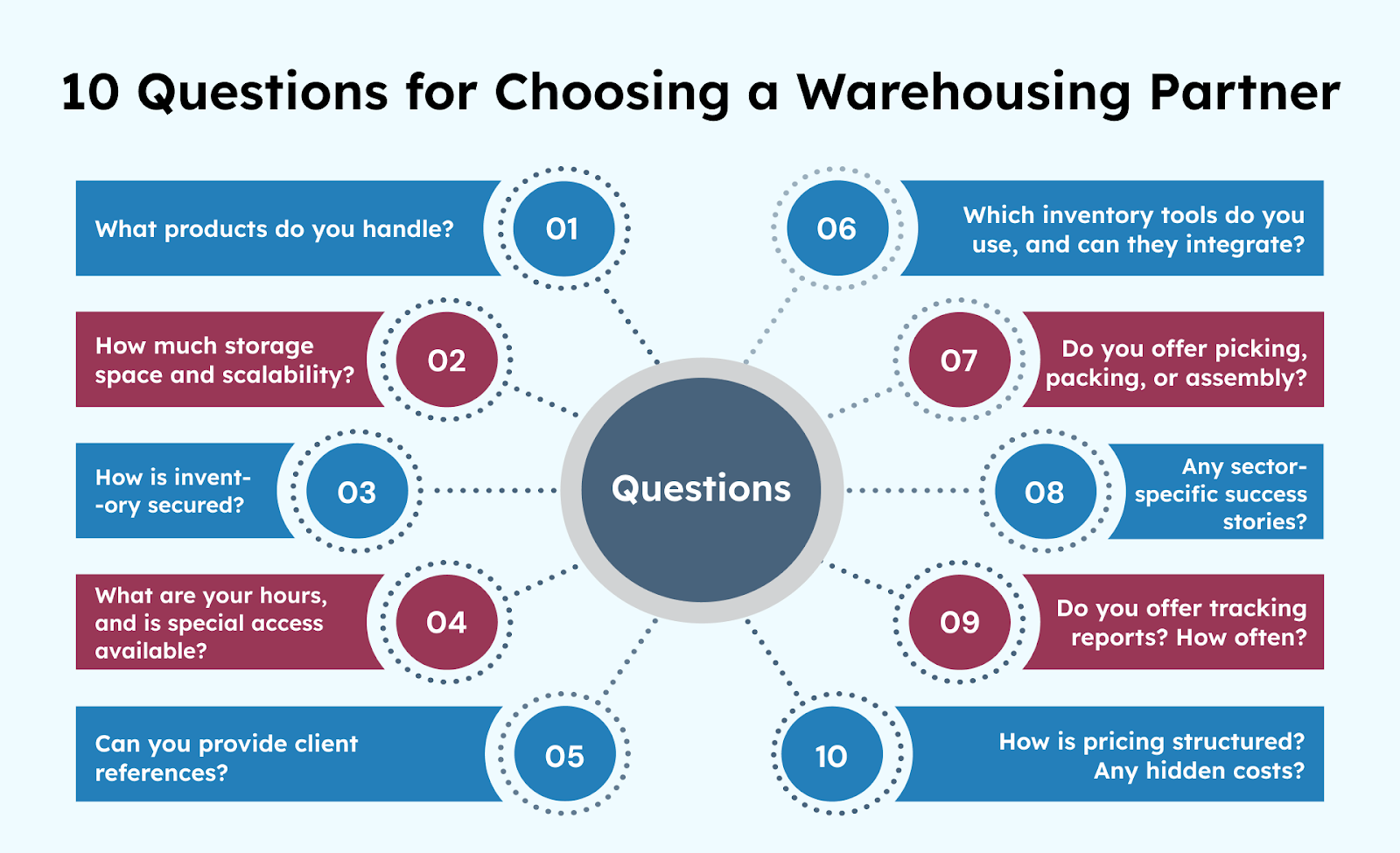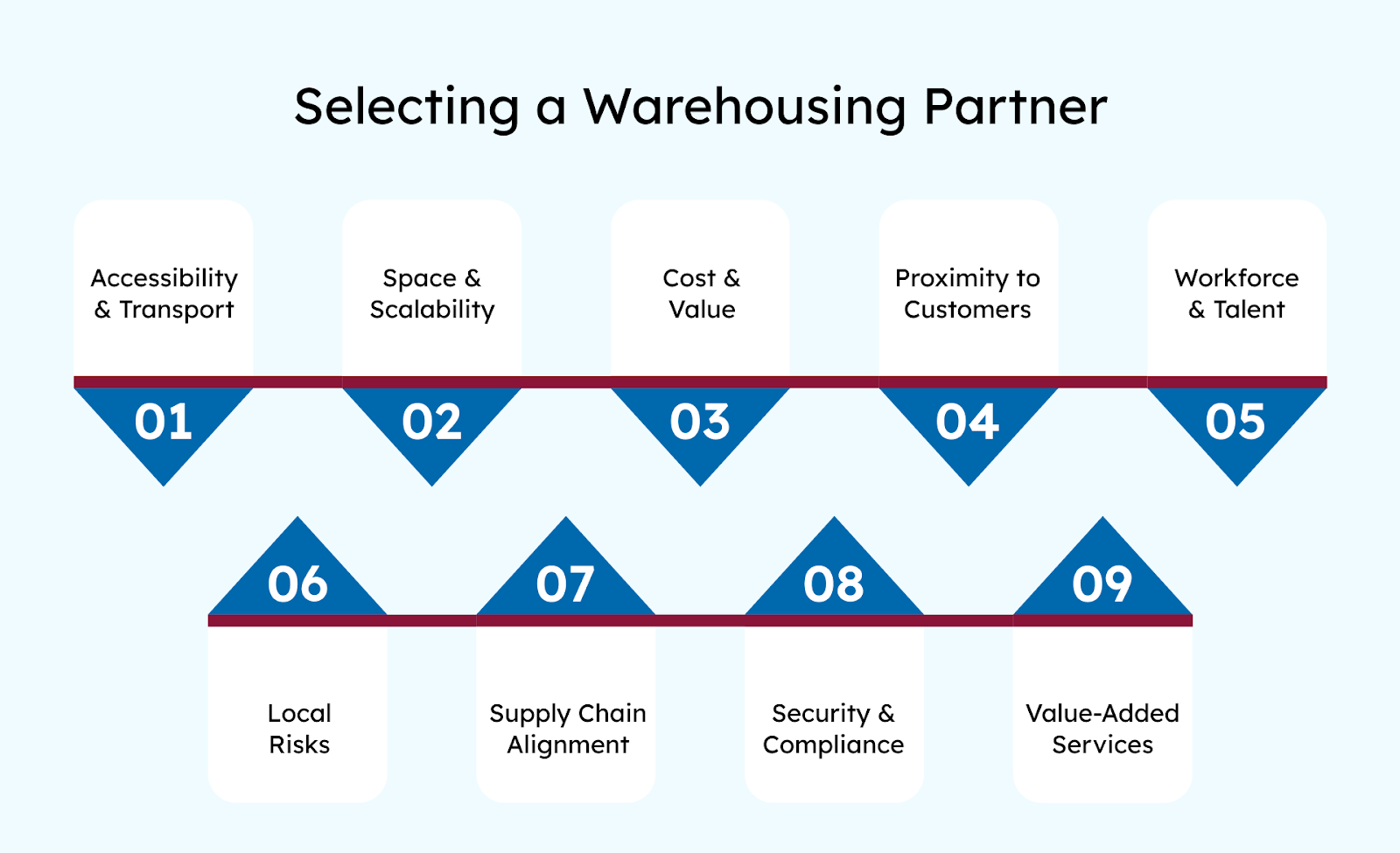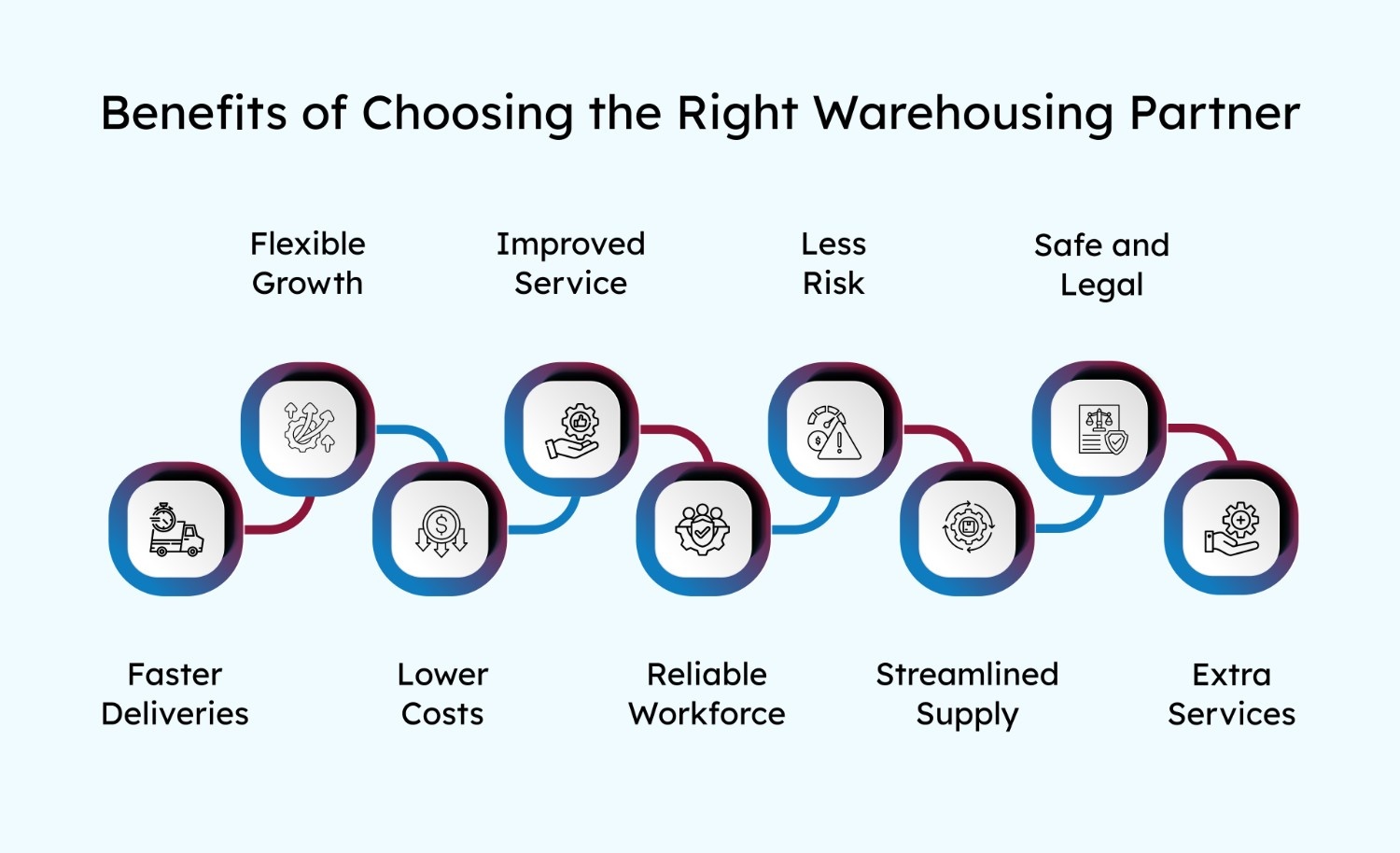New research from Accenture shows that companies with the most mature supply chains are 23% more profitable than their peers. This is clear proof that a well-optimised supply chain and the choice of a warehousing partner are no longer a background decision; they are a strategic necessity. The wrong partner can derail your delivery timelines, inflate operational costs, and leave customers frustrated.
From poor location choices to inefficient inventory handling, warehousing missteps create chain reactions that damage your bottom line. Yet, many businesses still overlook the importance of vetting warehouse providers with the same rigour as they apply to core operations.
This guide breaks down the essential factors you need to weigh before choosing a warehousing partner because your logistics deserve more than guesswork.
What is a Warehousing Partner?
A warehousing partner stores and manages your products, helping you optimise logistics and focus on growing your business. They handle inventory, shipping, and even packaging tasks, making your supply chain more efficient.
The right warehousing partner can enhance your service speed and reduce costs. This support is valuable everywhere, ensuring your goods move smoothly from the warehouse to the customer without hassle. With a trusted partner, you gain better control, save time, and improve customer satisfaction.
So, what should you look for in a warehouse partner? Here are some questions to help you find one.
Ten Questions You Should Ask While Looking For a Warehousing Partner

Before you lock in a warehousing partner, it’s vital to assess whether their services align with your business goals. Ask them the following questions:
- What kinds of products do you typically handle in your facility?
- How much storage space do you offer, and can you scale if my needs grow?
- What are your standard working hours, and is there room for special access when needed?
- What systems do you have in place to secure my inventory against theft or damage?
- Can you share references or feedback from other clients you’ve worked with?
- Do you support additional services, such as picking, packing, shipping, or light assembly?
- Which inventory management tools do you use, and can they connect with my existing systems?
- How is your pricing structured, and are there any additional costs I should be prepared for?
- Have you served businesses in my sector, and what wins can you share from those partnerships?
- Do you offer inventory and order tracking reports, and how often will I receive them?
Selecting a warehousing partner goes beyond securing storage space; it’s about aligning with a provider that supports your operations, growth goals, and service standards. Asking thoughtful questions early on can prevent delays, reduce costs, and help determine whether the provider can meet your business's speed and expectations.
Now that you know what to ask, let’s look at the most critical factors you should consider when selecting the right warehousing partner.
Also Read: Understanding Fourth Party (4pl) Logistics: Definition and Insights.
Essential Factors to Consider When Selecting a Warehousing Partner

Finding the ideal warehouse isn’t just about location; it’s about making sure of long-term efficiency, cost-effectiveness, and scalability for your growing business.
1. Accessibility and Transport Links
Choose a location that offers smooth road access, especially if your operations depend on land transport for last-mile delivery and supply chain flow. Avoid overly remote or congested areas. While the outskirts reduce costs, poor connectivity and traffic delays can disrupt shipments and hurt customer satisfaction.
Example: Facilities situated on congested or narrow roads can cause delivery delays, especially during peak traffic hours in Doha.
Also Read: The Ultimate Guide to Last Mile Delivery and Logistics
2. Space and Scalability
Don’t just look at present needs. Ensure the warehouse can support your growth in volume, variety, and operational complexity over time. The space should support safe storage and product protection. Partner with providers who offer flexible layouts across multiple facilities, as needed.
Example: Choosing a warehouse with modular racking and flexible layouts enables businesses to expand storage capacity as product ranges and inventory volumes increase.
3. Cost and Value
A warehouse with high rent can strain your margins. Compare pricing structures carefully before signing a lease or long-term agreement. Seek competitive options offering transparent rates. Some logistics providers lower margins by scaling volume, passing those cost benefits to you.
With solutions like WareOne, shared warehouse spaces using variable pricing models allow small and medium-sized enterprises to pay only for the space they use, boosting cost efficiency without long-term commitments.
4. Proximity to Customers
Warehouses closer to your customers reduce delivery time and boost satisfaction, which is critical. If your customer base is spread nationwide, consider implementing a networked warehousing strategy to serve regions more efficiently and quickly.
Example: Warehouses located near dense urban areas, such as central Doha, ensure that faster last-mile deliveries improve customer satisfaction in competitive markets.
5. Workforce and Talent Pool
A location with access to skilled, affordable workers helps ensure smoother operations across packaging, dispatch, and inventory handling. However, to avoid saturated markets with too many similar businesses, competition for talent can drive up costs and lead to reduced retention.
Example: Facilities located far from populous areas may experience higher labour costs and retention issues due to longer commute times for workers.
6. Local Conditions and Risks
Warehouses handling sensitive, hazardous, or odourous items should be situated away from residential areas to minimise complaints and potential legal issues. Also, avoid disaster-prone regions. Frequent disruptions from floods, storms, or heat waves can delay orders and damage inventory.
Example: Selecting warehouses away from flood-prone zones and coastal areas minimises the risk of weather-related inventory damage and operational downtime.
7. Supply Chain Alignment
A strategic location near your suppliers, shipping partners, or major transit hubs simplifies logistics and keeps distribution costs in check. If your business involves imports or exports, consider selecting a warehouse located near a major seaport or international airport for faster cargo movement.
Example: Warehouses located near major shipping hubs, such as Hamad Port, facilitate quicker unloading and reduce container turnaround times for import-heavy businesses.
8. Security and Compliance
Strong security is non-negotiable. Look for surveillance systems, gated access, and 24/7 monitoring to protect your inventory. Ensure that the warehouse complies with all relevant industry regulations. This builds customer trust and protects your business from legal or financial risks.
Example: Compliance with local regulations, such as those of the Qatar Civil Defence and health standards, ensures smooth operations and fosters trust with clients and partners.
9. Value-Added Services
Warehouses offering kitting, packaging, labelling, or custom clearance help you cut lead times and operational friction. These services optimise fulfilment, reduce handling costs, and help you compete better in fast-moving markets.
Example: Facilities that provide customs clearance assistance and real-time inventory tracking can expedite cross-border shipments and enhance order accuracy.
Also Read: Choosing the Right Fulfilment Partner for Your Business
Benefits of Choosing the Right Warehousing Partner

Choosing the right warehouse partner is more than just finding a place to store goods; it can help your business run smoother, save money, and grow over time. Here’s how the right partner can make a difference:
- Faster Deliveries: Warehouses located near major transport hubs, such as Hamad International Airport and main roads, help reduce shipping times, allowing your customers to receive their orders more quickly.
- Flexible Growth: Warehouses with adjustable space and layouts can accommodate more products or seasonal spikes without requiring a move to a new location.
- Lower Costs: Utilising bonded or shared warehouses can help you save money on storage and customs fees, thereby improving your overall budget.
- Better Customer Service: Having warehouses near cities or in multiple locations helps you deliver orders faster and keeps customers happy.
- Reliable Workforce: A strong warehousing partner ensures a reliable and well-trained workforce, crucial for smooth daily operations, efficient inventory handling, and consistent order fulfilment.
- Less Risk: Selecting warehouses located away from flood zones or residential areas helps avoid damage to goods and potential legal issues.
- Simpler Supply Chain: Warehouses located near ports, suppliers, or border crossings facilitate faster and more efficient product movement, reducing delays.
- Safe and Legal: Warehouses with robust security and adherence to local regulations protect your products and your business.
- Extra Services: A top-tier warehousing partner provides valuable extra services such as packaging, labelling, and customs assistance, which significantly streamlines your order processing, saving time and reducing potential errors.
Finding a warehouse partner that offers these benefits builds a strong base for your business to succeed in this fast-moving market. This is where WareOne comes in, providing the right locations, services, and support to help your business grow smoothly.
Why Choose WareOne as Your Warehousing Partner?
WareOne offers customised warehousing solutions tailored to meet your specific business needs. Here’s how we stand out:
- Unmatched Flexibility and Control: Experience hassle-free storage with our truly flexible terms. Store as little as one pallet for as short as one day, paying only for the space you use without long-term commitments.
- Transparent and Fair Pricing: Our commitment to transparency means you only pay for what you use. Our usage-based model adapts automatically as your needs change, ensuring clear, predictable costs with no hidden charges.
- Advanced Technology and Management: Gain complete visibility and effortless management through our intuitive digital dashboard. Track your inventory, oversee multiple bookings, and streamline your operations with intelligent, real-time insights.
- Robust Security, 24/7: Your goods are protected around the clock. Our facilities feature continuous security personnel, comprehensive CCTV monitoring, secure access control systems, and individual unit alarms, providing peace of mind.
- Strategic and Connected Locations: Benefit from warehouses strategically positioned near vital transport routes. This ensures convenient access, optimises distribution operations, and facilitates efficient reach across the GCC.
- Integrated Logistics and Value-Added Services: Beyond storage, WareOne offers a comprehensive suite of end-to-end logistics solutions, including cost-efficient transportation, customs clearance, expert packaging, and streamlined distribution. This integrated approach optimises your entire supply chain for efficiency and reduced complexity.
Choosing WareOne as your warehousing partner means more than just storage; it’s about improving your business’s efficiency and scalability in today’s dynamic market.
Conclusion
Choosing the right warehousing partner is a strategic decision that directly impacts your delivery timelines, operational costs, and business growth. From location and scalability to compliance and added services, each factor plays a role in keeping your supply chain efficient and your customers satisfied. When these elements come together under one roof, you attain a reliable foundation for success.
If you’re looking for a warehousing partner that offers flexible terms, comprehensive support, and invaluable local expertise, WareOne is the ideal choice. Explore our solutions and book a storage unit today.
FAQs
Q1. How does a warehousing partner impact supply chain efficiency?
A. The right warehousing partner ensures smooth inventory flow, faster fulfilment, and fewer delays, directly improving overall supply chain performance.
Q2. How can a warehousing partner help reduce costs?
A. Flexible storage, shared spaces, and transparent pricing from a reliable warehousing partner help businesses avoid unnecessary overheads.
Q3. Is scalability important when choosing a warehousing partner?
A. Yes, your warehousing partner should offer scalable space and services to grow with your business and adjust to changing demand.
Q4. What value-added services should a warehousing partner offer?
A. Services like packaging, labelling, and customs support help simplify operations and reduce turnaround times with the right warehousing partner.
.jpg)